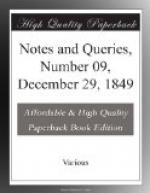“When I was in the middest of this discourse, I received a message from my lord chamberlaine, that it was his majesty’s pleasure that I should preach before him upon Sunday next; which Scarborough warning did not perplex me, but so puzzled me, as no mervail if somewhat be pretermitted, which otherwise I might have better remembered.”
Quoted in Caldwell’s Conferences, p. 166.
W.M.C.
[NARES tells us, that Ray, on the authority of Fuller, states that this saying took its origin from “Thomas Stafford, who, in the reign of Mary, A.D. 1557, with a small company, seized on Scarborough Castle (utterly destitute of provision for resistance), before the townsmen had the least notice of their approach;” but shows that it was probably much older, as, in a ballad written by J. Heywood on the taking of that place by Stafford, the following more probable origin is given to the proverb:—
“This term Scarborow
warning grew (some say),
By hasty hanging for rank robbery theare.
Who that was met, but suspect in that way,
Straight he was trust up, whatever he were.”
This implies that Scarborough imitated the Halifax gibbet law. Is any thing known of such a privilege being claimed or exercised by the men of Scarborough? We should be glad to hear from any local antiquary upon this point.]
Gray’s Elegy.—In answer to your correspondent, J.F.M. (p. 101.), who asks for information respecting the competition for the best translation of Gray’s Elegy, in which Dr. Sparke was a candidate, I would beg to refer him to the satirical poem attributed to Mr. T.J. Matthias, formerly Fellow of Trinity College, Cambridge, entitled The Pursuits of Literature, in which a ludicrous account is given of the affair. It does not appear who offered the prize, but Mr. Nares, the editor of The British Critic, was the judge, and the place of meeting “The Musical Room in {139} Hanover Square,” which was decorated for the occasion with appropriate scenery—at least so says The Critic. He thus describes the solemnity (p. 174 8th edit. 1798):—
“Lo, learned clerks in sable stole,
Graceful in years, pant eager for the
goal.
Old Norbury starts, and, with the seventh-form
boys,
In weeds of Greek the church-yard’s
peace annoys,
With classic Weston, Charley Coote and
Tew,
In dismal dance about the mournful yew.
But first in notes Sicilian placed on
high,
Bates sounds the soft precluding symphony;
And in sad cadence, as the bands condense,
The curfew tolls the knell of parting
sense.”
The distribution of prizes is thus recorded, Dr. Norbury being apparently the “conqueror:”—




